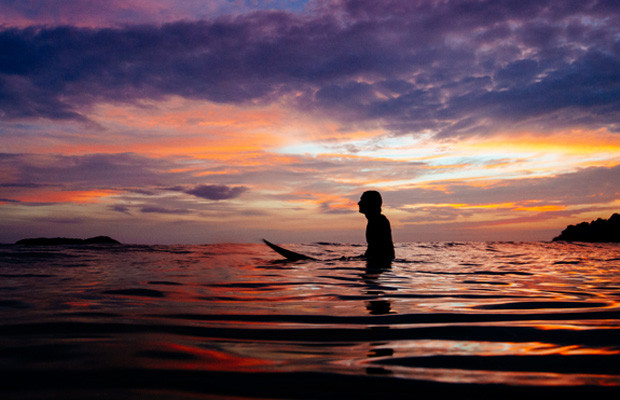Why This Tech Entrepreneur Got Rid Of All Her Possessions And Lived As A Nomad For A Year

My husband, Parag, and I are walking the long hallway of our four-bedroom house in Los Altos Hills, California. We come to the room we’ve been using as a gym, I do a quick inventory: treadmill, stationary bike, stair stepper, set of weights. A framed mirror we never got around to mounting leans against the wall. In the small room we introduce to guests as “the ironing room” there’s an ironing board, a guest bed, a chest of drawers, a floor lamp, and a collection of shag poufs. Parag and I agree: Donate it all. There’s the dining room we converted when we moved in, installing a high-definition projector and wall-sized screen, a state-of-the-art sound system, and the most comfortable L-shaped couch the world has ever known. My husband looks at me and we both wonder the same thing. How did we acquire so much stuff?
Two years earlier we had been living in a modest, craftsman-style bungalow in Atlanta. Parag was a professor at Georgia Tech in an obscure field combining artificial intelligence and music, and I was a struggling entrepreneur without a salary. Our house was in a part of the city known as Old Fourth Ward, where break-ins and vandalized cars were not uncommon—but we felt safe because we had nothing much to steal: a vintage couch we’d found on Craigslist, an IKEA footstool, an old TV.
Then, one sweltering July morning, I woke up ragged with nerves. My latest startup, which I’d founded with my husband, had launched a new iPhone app a few days earlier—a quirky little thing called Songify, which turns spoken word into song. I checked my phone to see how highly we were ranked in the App Store and had the shock of my life: Songify was number one, the most downloaded free iPhone app in the world. My inbox was flooded with messages—from TV stations and newspapers requesting interviews, from investment firms eager to learn more about our growth plans.
Suddenly, everything changed. Within six months we’d moved to the Bay Area, merged with a larger company in Silicon Valley, and taken lucrative jobs as executives there. We had money for the first time in our lives and quickly leased a house in a scenic neighborhood—a decision that opened the floodgates. We spotted handsome furniture through our neighbors’ windows and we saw the expensive cars in their driveways. The houses on either side of ours had infinity pools overlooking private mini-vineyards. One neighbor, who had sold his company for hundreds of millions during the first dot-com boom, was installing a zip line to encourage his children to spend more time outdoors.
We bought and bought and bought: Persian rugs, espresso machines, decorative lamps. We joined a private social club in San Francisco. We developed a taste for rare Napa wines.
We decided to replace our car, an old black Hyundai Sonata, with something in keeping with our new status—a Tesla or a Maserati (the two most popular models in our neighborhood), and argued over which we should get.
“A Tesla will seem more techy,” I said. “And it’s better for the environment.”
“But a Maserati is so much cooler,” countered my husband.
“All you care about anymore is looking cool!”
What had happened? We never used to fight. In trying to understand what was making us so unhappy, we found ourselves reminiscing about a trip we’d taken when we were still living in Atlanta to a sleepy surf town in Costa Rica. We’d met people who traveled from place to place, staying for weeks or months at a time, moving on a whim, whenever fancy would strike. The idea seemed irresistibly appealing: a life driven by experience and adventure, not by a desire for more things.
If we radically scaled back, we reasoned, we could try to live like them. We had enough savings to last several years. We had talked about writing a novel together, of learning to surf. This could be the time to pursue those ambitions. Maybe we would return to the working world and do another startup one day. Or maybe we’d simply become nomads and live off the sales from our book.
Full of exuberance, we quit our jobs, booked plane tickets—and faced the question of what to do with everything we owned. We packed a storage unit with a few items of furniture and the things we couldn’t bear to get rid of. This we would hold on to for twelve months. Our Sonata we’d store as well. As for our keepsakes—the photos and books and music that held so many memories—we digitized them, transferring everything to a couple of slim hard drives no bigger than our passports.
All we would carry would be a single suitcase, two small backpacks, two computer bags, and my husband’s hard-shelled guitar case (he plays a Indian classical acoustic instrument called a sarod). We hadn’t settled on a route, but I was envisioning warm beaches, which made packing easy. Bikinis don’t take up much space.
We set off in November. Our first stop: the Costa Rican surf town that had inspired this adventure. We arrived with a booking in a modestly priced hotel, and began looking for somewhere to rent close to the beach. To call what we ultimately found a house would be a stretch. On top of a hill, it had a spectacular view—but only the bedroom was enclosed. The dining area, bathroom, and kitchen—equipped with two plates, two bowls, two mugs, and two wine glasses, and a refrigerator with a padlock to keep out the raccoons—were all open to the elements.
I was surprised by how quickly we adjusted and settled into a new routine. We would wake up with the sun, no alarm needed, and go for a morning surf. After breakfast, we would walk along the beach to a nearby eco-resort, where we would sit in a swing chair, sip coconut water, and work on our book.
Work felt different in that swing chair. The intensity of the afternoon heat made it difficult to put in long hours of writing, but my productivity was nevertheless greater than it had ever been. My mind was quiet and clear, not cluttered by endless social chatter. Focus came easily. In the afternoons we’d buy groceries or wash our few clothes. My husband liked to surf at sunset, and I did yoga. Days slipped by like this, and then weeks. We stayed three months in that little house on the hill. This would prove to be our longest stretch of living in one place for the rest of the year.
We traveled to El Salvador and Panama, then took a long haul to Sri Lanka and India. We made our way west via the Swiss Alps and Crete. Moving around was remarkably easy. We booked houses on Airbnb a week or two in advance. It took less than an hour to pack everything and go. The spontaneity was thrilling.
The Internet was everywhere, even if the connection speed could be painfully slow at times. But instant connectivity was another thing we learned to live without. I started forgetting to charge my iPhone at night during those first months in Costa Rica, and it stayed tucked away in my computer bag for weeks at a time.
We befriended other travelers, especially in Sri Lanka, where we spent a month in a communal guesthouse near the beach. Our social life there became vibrant and spontaneous in a way we hadn’t experienced for years. The idea of laboriously scheduling a dinner date weeks in advance, as we had in San Francisco, suddenly seemed absurd. We would meet up with couples or families for a drink or dinner and I learned to stop asking them “So—where are you from?” and “What do you do?” We talked about casual things—the quality of the surf that day, the color of the sky at sunset.
About ten months into our trip, somewhere between the Swiss village of Mürren, where we hiked dramatic alpine meadows, and the remote house in Crete, with its walled garden of olive trees and sugar beets, I felt my mind go quiet. I felt somehow in command of myself. Freedom was what mattered to me, I realized, more than status symbols, more even than making a positive impact on the world, which I believed in dearly. The drive I used to feel—the relentless need to check boxes, to achieve success at all costs—had all but disappeared. It was as though I had disappeared, but in the most pleasant way possible.
The only problem was the book we’d been writing, which wasn’t coming together as I’d hoped. Parag and I had produced several hundred pages, exchanging revisions, discussing plot and character. Despite our best efforts, it was proving sprawling and unmanageable. We sent some 40,000 words to friends and received friendly but firmly critical responses. In our hearts we knew we had to start over. We also knew that this was normal, that novels are written in this halting, iterative way. Then, a part of me wondered if there was room for innovation here. I began to imagine a social fiction app for a smartphone. Storytelling for the Snapchat generation.
We decided to stop by Silicon Valley to test out the idea. For a few weeks we’d stay in Airbnbs, catch up with friends and perhaps put out feelers about funding. We wanted to be back in Costa Rica by Christmas.
Before I knew it a familiar pressure started to build. Everywhere I looked, people had new iPhones. It was chilly in San Francisco that winter, and all my female friends had great-looking boots. I found myself wanting to shop again. But I also noticed a few other things: a friend who had recently replaced his car with a bike. Another who had gotten rid of most of her possessions and moved with ten others into a communal house. A couple we knew with two children had quit their stable jobs to freelance, cutting their expenses in half. Parag and I began to wonder if we really had to wander the world to feel spontaneous and unburdened.
Christmas came and went. We pitched my idea as a media startup and began meeting investors and raising money in earnest.
And so, one balmy spring afternoon in San Francisco, I pulled up to a conspicuously tall gray building in the Financial District. A valet opened my door and greeted me with a mild smile. Perhaps he wasn’t used to receiving guests in dusty Sonatas; he certainly didn’t remember me, though this was the private club Parag and I had once been members of.
Inside, I told the hostess the name of the investor I was there to meet, and she showed me to where he was sitting at a long wooden table. We shook hands, exchanged pleasantries. Just as his eyes began to glaze over from small talk—he had been fielding startup pitches since morning—he asked the question I’d learned to expect. “So where do you live?” I could have named the under-the-radar San Francisco neighborhood Parag and I were staying in. Instead I said what felt more true. “Nowhere exactly.”
I had his attention.
“We’re homeless,” I said. “Airbnbs here and there. We’ve been traveling for a year, so we’re nomadic at the moment.”
“But you’ll be settling down somewhere when you close funding?”
“Maybe,” I said and smiled.
We successfully secured a round of funding that spring, enough to hire a small team. Then, with some hesitation, we signed a twelve-month lease on an apartment. We decided to keep it sparely furnished, to think twice before buying anything. We would focus on the right things this time.
One last task remained, one that we’d been dreading. We drove out to our storage unit in San Jose, lifted the squeaky garage door. A dusty lampshade toppled off a tall stack of boxes and fell to the ground. We spent the afternoon sifting through what was there. I rescued a pair of boots I’d forgotten about. My husband grabbed some wine glasses and a coffee jug. Then we shut the door and left. Donate it all.
Via Vogue













 © 2024
© 2024
0 comments